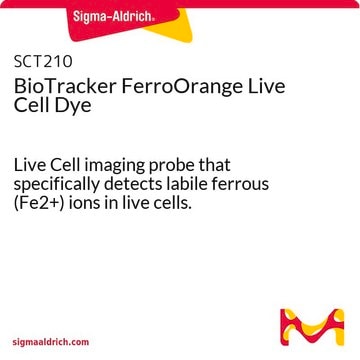SCT240
BioTracker™ Blue TFCH Oxidative Stress Probe
Synonyme(s) :
Live Cell Imaging Probe
About This Item
Produits recommandés
Source biologique
human
Niveau de qualité
Poids mol.
calculated mol wt 280.63 kDa
Conditionnement
vial of 1 mg
Fabricant/nom de marque
Millipore
Mode de croissance
N/A
Technique(s)
cell based assay: suitable
flow cytometry: suitable
immunofluorescence: suitable
Méthode de détection
fluorometric
Conditions d'expédition
dry ice
Température de stockage
−20°C
Description générale
Application
Caractéristiques et avantages
Forme physique
Stockage et stabilité
Autres remarques
Informations légales
Clause de non-responsabilité
Mention d'avertissement
Warning
Mentions de danger
Conseils de prudence
Classification des risques
Eye Irrit. 2 - Skin Irrit. 2 - STOT SE 3
Organes cibles
Respiratory system
Code de la classe de stockage
11 - Combustible Solids
Classe de danger pour l'eau (WGK)
WGK 3
Certificats d'analyse (COA)
Recherchez un Certificats d'analyse (COA) en saisissant le numéro de lot du produit. Les numéros de lot figurent sur l'étiquette du produit après les mots "Lot" ou "Batch".
Déjà en possession de ce produit ?
Retrouvez la documentation relative aux produits que vous avez récemment achetés dans la Bibliothèque de documents.
Notre équipe de scientifiques dispose d'une expérience dans tous les secteurs de la recherche, notamment en sciences de la vie, science des matériaux, synthèse chimique, chromatographie, analyse et dans de nombreux autres domaines..
Contacter notre Service technique







